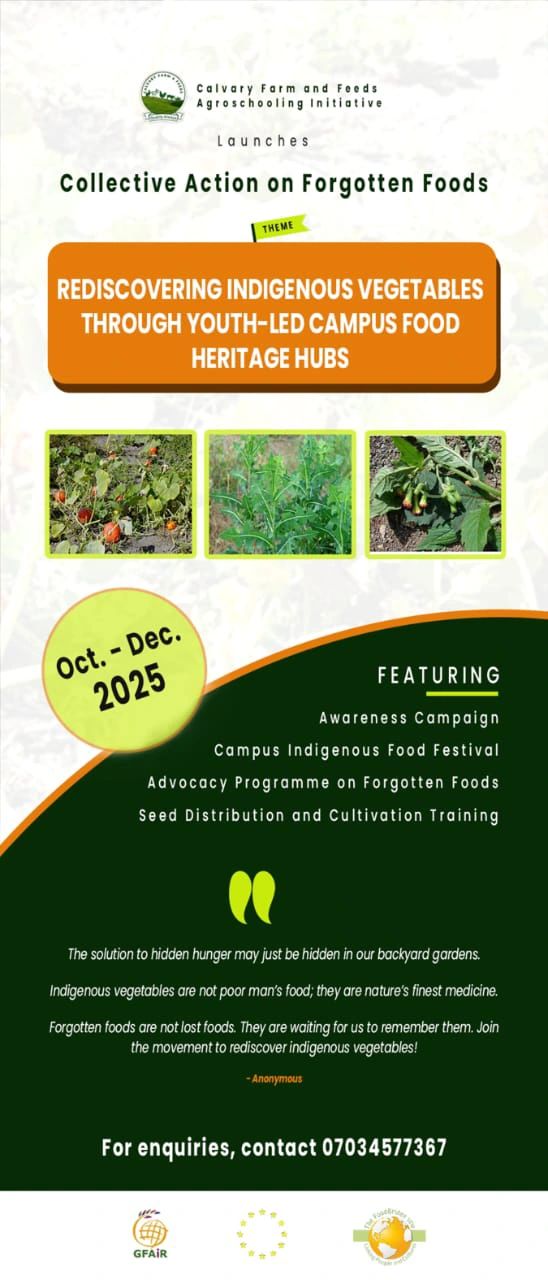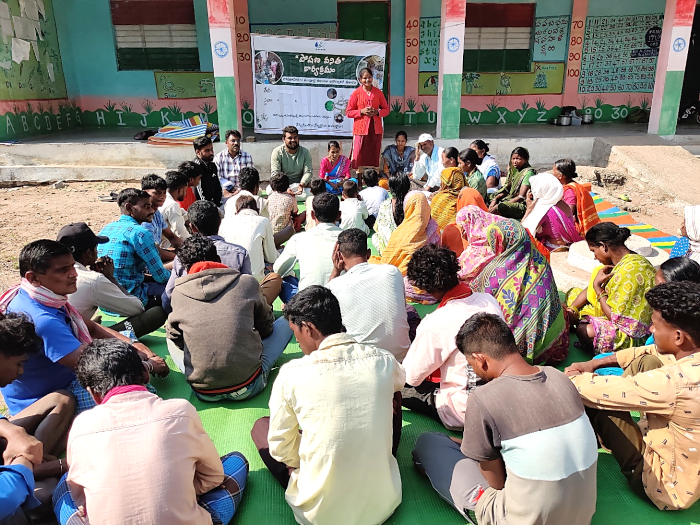6 November 2025. The Collective Action on Forgotten Foods coordinated by Foodbridge and funded by GFAiR launched in September a Call for Projects: Forgotten Foods Youth Challenge 2025 - Reconnecting Africa’s Youth with Indigenous Food Heritage.
This pilot in Nigeria and Ghana is to served as a proof of concept, generating measurable results to attract further investment and upscaling across Africa.
3 winners were selected of which the CFF AGROSCHOOLING PROJECT.
It hosted the Campus Indigenous Food Festival and Cooking Competition at the University of Ibadan, in collaboration with the National Association of Agricultural Students (NAAS UI). 10 talented youth chefs showcased their creativity using indigenous vegetables to prepare mouthwatering dishes such as:
- Efo Odunjejalo with Semo
- Edikaikong with Eba
- Efo Tete and Seasoned Rice
- Efo Ebelo and Pounded Yam
- Egunsin Soup and Semo
The chefs took time to enlighten participants about these traditional vegetables and sharing their inspiration behind the dishes. The guests also discussed the nutritional benefits of indigenous vegetables and youth participation in their cultivation and promotion.
The CFF AGROSCHOOLING PROJECT distributed indigenous vegetable seeds to youths and organized an exhibition showcasing other forgotten vegetables.

Objectives & Activities of the Collective Action on Forgotten Foods
- Multi-stakeholder write-shops (Ghana, Nigeria) to co-develop proposals linking forgotten foods
with women’s health, youth, climate resilience, and digital innovation. - Diaspora market engagement through African diaspora food market studies in London (and planned in Paris), identifying demand drivers and niche opportunities.
- Digital innovation pilots via the GAMAAL App, connecting women cooks and farmers with diaspora and urban consumers. To be tested in Kumasi (Ghana) and Abuja (Nigeria)depending on funding.
- Awareness campaigns including culinary demonstrations, storytelling, cultural tourism events (e.g., African Diaspora Food Forum), and side-events at major international conferences (Biodiversity Conference Kunming, UNFSS+4 Addis Ababa).
- Youth-focused pilots such as school gardens in Nigeria to integrate forgotten foods into nutrition, climate-smart practices, and waste reduction education.

- Policy engagement pilots through proposals (e.g., Pivotal Ventures, One Planet Network, INCiTiS-FOOD) advocacy at FAO, FfD4 (Sevilla), and UNFSS: Alliance for Local Food and Nutrition Supply Chains in Africa (Alliance Africa).
- Community of Practice (CoP) building via FARA and GFAiR, now with 650+ members, to foster exchange on research, policy, and practice for forgotten foods.
- Diaspora entrepreneur engagement linking food SMEs and diaspora chefs to promote heritage foods in premium urban and international markets (e.g., Compendium 2024 African Diaspora Agrofood Entrepreneurs)
Related resource:
07/11 Ensuring Nutrition Security through Nutrition Change Agents

Despite large-scale food security programmes, malnutrition continues to affect both rural and urban families in Telangana (India). The reasons lie in limited dietary diversity, monocropping systems, lack of nutrition awareness, and weak linkages between food production and consumption. Farmers often grow commercial crops for markets rather than diverse and nutritious foods for their households, resulting in a disconnect between what is produced locally and what is consumed, which limits nutritional outcomes.
To address these gaps, WASSAN initiated the Malnutrition-Free Gram Panchayats programme in Vikarabad district, Telangana, in November 2022 with an integrated approach that combines sustainable agriculture, nutrition-sensitive farming, and capacity building for women and youth.
The programme was aimed at ensuring nutritionally vulnerable families, especially women, children, and the elderly, access to adequate, safe, and nutritious food through building self-reliant, malnutrition-free communities
